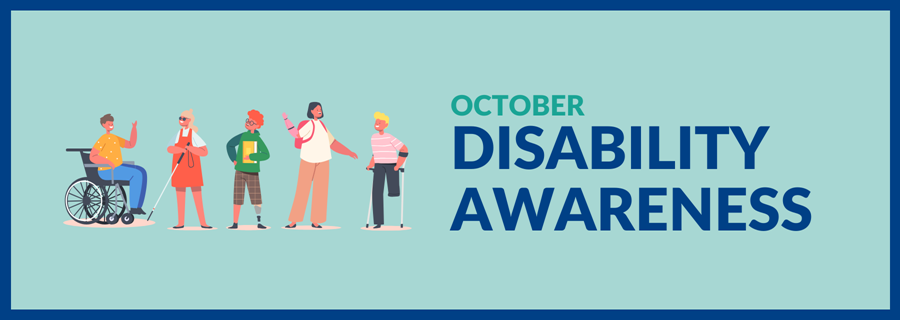October is a month dedicated to raising awareness, advocating for inclusion, and celebrating the unique contributions of individuals with disabilities. It’s an opportunity to shine a light on various conditions, both visible and invisible, while fostering a culture of acceptance and support. At the Association of Washington School Principals (AWSP), we are proud to recognize and honor the diverse experiences within our communities.

Celebrating Disability Awareness in October: Honoring Diversity and Inclusion
October is a month dedicated to raising awareness, advocating for inclusion, and celebrating the unique contributions of individuals with disabilities. It’s an opportunity to shine a light on various conditions, both visible and invisible, while fostering a culture of acceptance and support. At the Association of Washington School Principals (AWSP), we are proud to recognize and honor the diverse experiences within our communities.
National Disability Employment Awareness Month (NDEAM) – October
At the heart of October’s awareness efforts is National Disability Employment Awareness Month, which celebrates the contributions of workers with disabilities and promotes inclusive employment practices. For principals, educators, and school leaders, NDEAM highlights the importance of fostering an inclusive culture within schools that values the abilities of all students and staff.
NDEAM serves as a powerful reminder of the need for accessibility and equity in the workplace, including the education sector. It encourages schools to:
• Promote Inclusive Hiring Practices: By advocating for inclusive hiring, schools can ensure that staff members with disabilities have equal opportunities to contribute and succeed. This not only enhances diversity but also provides students with visible role models who reflect a range of experiences and abilities.
• Ensure Accessibility in the Classroom: Creating accessible learning environments is essential for students with disabilities to thrive. NDEAM emphasizes the need for accessible classrooms, adaptive technology, and accommodations that support diverse learning needs.
• Support Career Readiness for Students with Disabilities: Schools play a vital role in preparing students with disabilities for the workforce. By integrating career readiness programs, work-based learning opportunities, and vocational training, educators can help students develop the skills needed for future employment.
• Educate the School Community: Use this month as an opportunity to raise awareness about disability inclusion among staff, students, and parents. By holding workshops, assemblies, and discussions, schools can foster a culture of understanding and support.
NDEAM not only celebrates the accomplishments of workers with disabilities but also underscores the ongoing need for advocacy and action to ensure equal opportunities for everyone. For principals, this means leading by example, championing inclusive practices, and empowering all members of the school community.
Additional Disability Awareness Days in October
In addition to NDEAM, there are several other important awareness days and months recognized this October:
• ADHD Awareness Month – October
ADHD Awareness Month in October highlights the importance of understanding and supporting students with Attention Deficit Hyperactivity Disorder, which affects focus, behavior, and emotional well-being in the classroom. Schools can create a more inclusive environment by:
• Structuring distraction-free learning spaces.
• Offering individualized instruction with movement breaks.
• Providing social-emotional support through counseling and peer programs.
• Collaborating with families to ensure consistent strategies.
• Utilizing legal protections like 504 Plans or IEPs for necessary accommodations.
• World Cerebral Palsy Day – October 6
This day raises awareness about cerebral palsy and advocates for accessibility and support for those living with the condition. It serves as a reminder to ensure schools are accessible and welcoming to students with mobility challenges.
• World Sight Day – October 10
Focused on eye health, this day encourages regular eye check-ups and supports initiatives for accessible learning materials for students with visual impairments.
• World Mental Health Day – October 10
Highlighting the importance of mental health, this day encourages schools to promote mental well-being among students and staff by providing resources, support systems, and reducing stigma around mental health issues.
• White Cane Awareness Day – October 15
This day emphasizes the independence of people who are blind or visually impaired. It’s a reminder for schools to educate students about visual impairment and the significance of mobility aids like the white cane.
• Invisible Disabilities Week – October 17-23
This week brings attention to disabilities that aren’t immediately noticeable, such as chronic pain, mental health conditions, and neurological disorders. Schools can use this time to educate the community on how to support students and staff with invisible disabilities.
• Down Syndrome Awareness Month – October
This month celebrates the abilities and achievements of individuals with Down syndrome. Schools can focus on inclusion by promoting activities that encourage peer engagement and understanding.
• Dyslexia Awareness Month – October
This month highlights the strengths of students with dyslexia and advocates for teaching strategies that support different learning styles, ensuring that all students can succeed.
• Spina Bifida Awareness Month – October
Recognizing spina bifida, this month encourages schools to ensure accessibility and support for students with physical challenges, advocating for inclusive sports and activities.
At AWSP, we are committed to promoting inclusivity and accessibility for everyone in our schools and communities. National Disability Employment Awareness Month and the related observances in October present a unique opportunity to educate, advocate, and create spaces where every individual is valued and supported. Let’s continue to work together to make our schools places where everyone can thrive.






